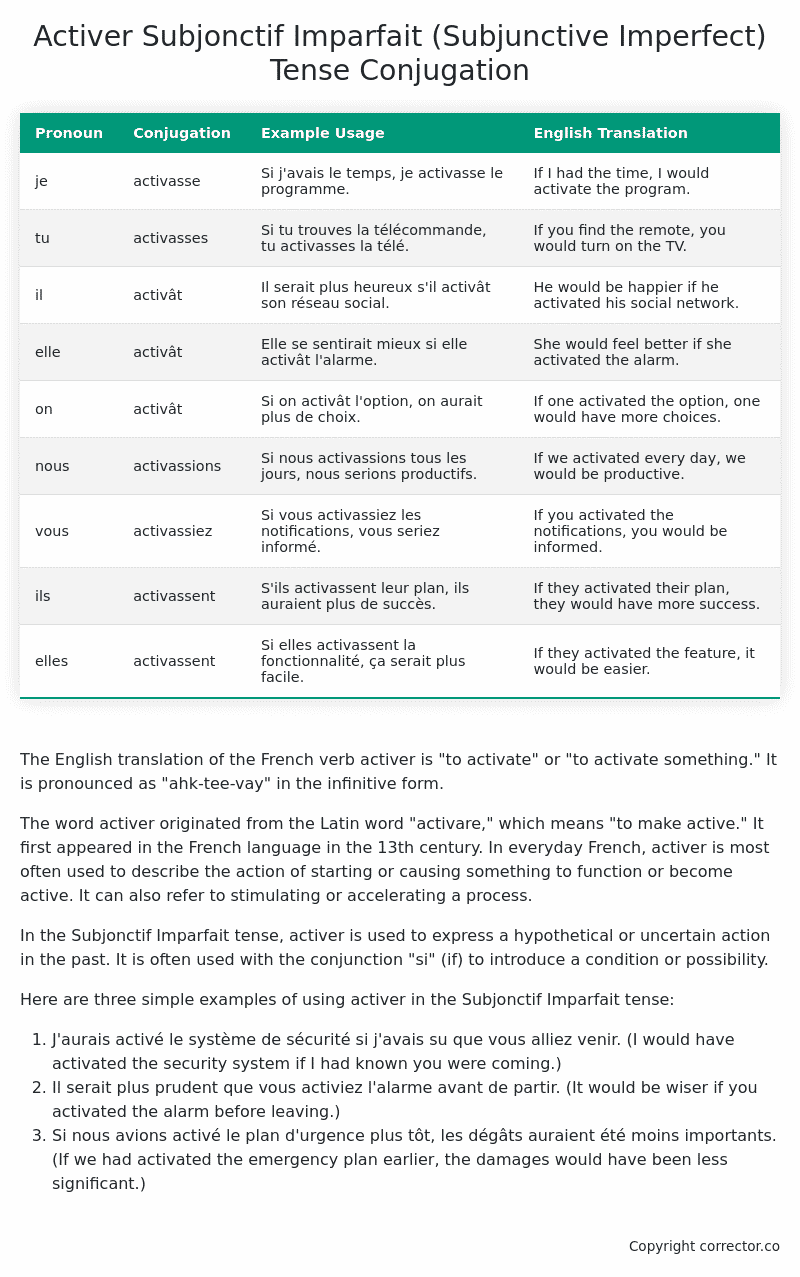Subjonctif Imparfait (Subjunctive Imperfect) Tense Conjugation of the French Verb activer
Introduction to the verb activer
The English translation of the French verb activer is “to activate” or “to activate something.” It is pronounced as “ahk-tee-vay” in the infinitive form.
The word activer originated from the Latin word “activare,” which means “to make active.” It first appeared in the French language in the 13th century. In everyday French, activer is most often used to describe the action of starting or causing something to function or become active. It can also refer to stimulating or accelerating a process.
In the Subjonctif Imparfait tense, activer is used to express a hypothetical or uncertain action in the past. It is often used with the conjunction “si” (if) to introduce a condition or possibility.
Here are three simple examples of using activer in the Subjonctif Imparfait tense:
- J’aurais activé le système de sécurité si j’avais su que vous alliez venir. (I would have activated the security system if I had known you were coming.)
- Il serait plus prudent que vous activiez l’alarme avant de partir. (It would be wiser if you activated the alarm before leaving.)
- Si nous avions activé le plan d’urgence plus tôt, les dégâts auraient été moins importants. (If we had activated the emergency plan earlier, the damages would have been less significant.)
Table of the Subjonctif Imparfait (Subjunctive Imperfect) Tense Conjugation of activer
| Pronoun | Conjugation | Example Usage | English Translation |
|---|---|---|---|
| je | activasse | Si j’avais le temps, je activasse le programme. | If I had the time, I would activate the program. |
| tu | activasses | Si tu trouves la télécommande, tu activasses la télé. | If you find the remote, you would turn on the TV. |
| il | activât | Il serait plus heureux s’il activât son réseau social. | He would be happier if he activated his social network. |
| elle | activât | Elle se sentirait mieux si elle activât l’alarme. | She would feel better if she activated the alarm. |
| on | activât | Si on activât l’option, on aurait plus de choix. | If one activated the option, one would have more choices. |
| nous | activassions | Si nous activassions tous les jours, nous serions productifs. | If we activated every day, we would be productive. |
| vous | activassiez | Si vous activassiez les notifications, vous seriez informé. | If you activated the notifications, you would be informed. |
| ils | activassent | S’ils activassent leur plan, ils auraient plus de succès. | If they activated their plan, they would have more success. |
| elles | activassent | Si elles activassent la fonctionnalité, ça serait plus facile. | If they activated the feature, it would be easier. |
Other Conjugations for Activer.
Le Present (Present Tense) Conjugation of the French Verb activer
Imparfait (Imperfect) Tense Conjugation of the French Verb activer
Passé Simple (Simple Past) Tense Conjugation of the French Verb activer
Passé Composé (Present Perfect) Tense Conjugation of the French Verb activer
Futur Simple (Simple Future) Tense Conjugation of the French Verb activer
Futur Proche (Near Future) Tense Conjugation of the French Verb activer
Plus-que-parfait (Pluperfect) Tense Conjugation of the French Verb activer
Passé Antérieur (Past Anterior) Tense Conjugation of the French Verb activer
Futur Antérieur (Future Anterior) Tense Conjugation of the French Verb activer
Subjonctif Présent (Subjunctive Present) Tense Conjugation of the French Verb activer
Subjonctif Passé (Subjunctive Past) Tense Conjugation of the French Verb activer
Subjonctif Imparfait (Subjunctive Imperfect) Tense Conjugation of the French Verb activer (this article)
Subjonctif Plus-que-parfait (Subjunctive Pluperfect) Tense Conjugation of the French Verb activer
Conditionnel Présent (Conditional Present) Tense Conjugation of the French Verb activer
Conditionnel Passé (Conditional Past) Tense Conjugation of the French Verb activer
L’impératif Présent (Imperative Present) Tense Conjugation of the French Verb activer
L’infinitif Présent (Infinitive Present) Tense Conjugation of the French Verb activer
Struggling with French verbs or the language in general? Why not use our free French Grammar Checker – no registration required!
Get a FREE Download Study Sheet of this Conjugation 🔥
Simply right click the image below, click “save image” and get your free reference for the activer Subjonctif Imparfait tense conjugation!

Activer – About the French Subjonctif Imparfait (Subjunctive Imperfect) Tense
Formation
Common Everyday Usage Patterns
Interactions with Other Tenses
Subjonctif Présent
Indicatif Passé Composé
Conditional
Conditional Perfect
Summary
I hope you enjoyed this article on the verb activer. Still in a learning mood? Check out another TOTALLY random French verb conjugation!


